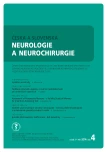-
Medical journals
- Career
Long‑term Observation of Cognitive, Emotional and Behavioral Changes in Patient with Multiple Sclerosis – a Case Report
Authors: A. Javůrková 1; J. Amlerová 2; J. Raudenská 3
Authors‘ workplace: Oddělení klinické psychologie, FN Královské Vinohrady, Praha 1; Neurologická klinika 2. LF UK Praha a FN v Motole, Praha 2; Oddělení klinické psychologie, 2. LF UK Praha a FN v Motole, Praha 3
Published in: Cesk Slov Neurol N 2014; 77/110(4): 501-504
Category: Case Report
Podpořeno Ministerstvem zdravotnictví ČR – RVO, FN v Motole 00064203.
Overview
The aim of the paper is to show cognitive, emotional and behavioural changes in a multiple sclerosis (MS) patient over eighteen years of observation. Case study documents maladaptation to MS diagnosis and prolonged maladaptive coping, diffusion and influence of affective components on inhibition of cognitive abilities and mental health status, the contribution of stress to development of „pseudo-relapses“ of MS, psychosocial problems and quality of life. The diagnosis of MS was devastating for the patient herself and her family. Its unpredictable course complicated adjustment and created difficulties in planning for support. Effects of disease-related stress as well as a negative side-effect of treatment led to many psychosocial problems that impaired the patient’s quality of life and affected compliance with treatment and rehabilitation. Repeated neuropsychological assessment was a part of a comprehensive diagnostic process and treatment of MS and, at the end of observation, in chronic-progressive phase of MS, was complemented with cognitive-behavioural therapy aimed at reducing burden of disease and improving the quality of life.
Key words:
multiple sclerosis – neuropsychological assessment – cognitive behavioral therapy
Sources
1. Kurtzke JF. Epidemiology of multiple sclerosis. Does this really point towards etiology? Neurol Sci 2000; 21(6): 383 – 403.
2. Havrdová E. Roztroušená skleróza. Cesk Slov Neurol N 2008; 71/ 104(2): 121 – 132.
3. Aronson KJ. Quality of life among persons with multiple sclerosis and their caregivers. Neurology 1997; 48(1): 74 – 80.
4. Kalb R. Multiple Sclerosis: a model of Psychosocial Support. London: National Multiple Sclerosis Society 2000.
5. Motl RW, McAuley E, Snook EM, Gliottoni RC. Physical activity and quality of life in multiple sclerosis: intermediary roles of disability, fatigue, mood, pain, self ‑ efficacy and social support. Psychol Health Med 2009; 14(1): 111 – 124. doi: 10.1080/ 13548500802241902.
6. José Sá M. Psychological aspects of multiple sclerosis. Clin Neurol Neurosurg 2008; 110(9): 868 – 877.
7. Gibson J, Frank A. Supporting individuals with disabling multiple sclerosis. J R Soc Med 2002; 95(12): 580 – 586.
8. Mohr DC, Likosky W, Bertagnolli A, Goodkin DE, Van Der Wende J, Dwyor P et al. Telephone ‑ administered cognitive ‑ behavioral therapy for the treatment of depressive symptoms in multiple sclerosis. J Consult Clin Psychol 2000; 68(2): 356 – 361.
9. Tesar N, Baumhackl U, Kopp M, Günther V. Effects of psychological group therapy in patients with multiple sclerosis. Acta Neurol Scand 2003; 107(6): 394 – 399.
10. Langenmayr A, Schöttes N. Psychotherapy with multiple ‑ sclerosis patients. Psychol Rep 2000; 86(2): 495 – 508.
Labels
Paediatric neurology Neurosurgery Neurology
Article was published inCzech and Slovak Neurology and Neurosurgery

2014 Issue 4-
All articles in this issue
- Sensory Examination
- Disorders of the Nervous System Arising out of Nutritional Insufficiency after Bariatric Surgery
- Genetic Variability in Attention Deficit Hyperactivity Disorder
- Anaplastic Oligodendrogliomas – the Age of Personalized Medicine Has Arrived?
- The Value of Repeated Non-confirmatory Multiple Sleep Latency Test (MSLT) for the Diagnosis of Narcolepsy
- Differences in Spatial Navigation Impairment in Neurodegenerative Dementias
- Assessing Handwriting in Patients with Parkinson‘s Disease
- AMETYST – Observational Phase IV Study Following the Influence of Intramuscularly Administered Interferon Beta‑1a in Patients with Clinically Isolated Syndrome/ Clinically Definite Multiple Sclerosis
- Hereditary Ulceromutilating Sensory Neuropathy – Clinical, Electrophysiological and Molecular Genetic Study of Three Families
- Limits of Verbal Fluency Tests Use in the Differential Diagnostic of Neurological Diseases
- Validation of the Minimum Question Set for the Diagnosis of the Restless Legs Syndrome in a Population of Czech Pregnant Women
- Findings in Cerebrospinal Fluid among Children with Paretic Involvements
- Long‑term Observation of Cognitive, Emotional and Behavioral Changes in Patient with Multiple Sclerosis – a Case Report
- Spinal Arteriovenous Malformations – Two Case Reports
- Total Avulsion of the Eye Globe Combined with an Injury of the Chiasm – a Case Report
- Assessment of Prospective Memory – a Validity Study of Memory for Intentions Screening Test
- The Significance Of (CA)n Tandem Repeat in GABA(A) Beta‑3 Subunit Gene in Tinnitus Manifestation
- Czech and Slovak Neurology and Neurosurgery
- Journal archive
- Current issue
- Online only
- About the journal
Most read in this issue- Sensory Examination
- Genetic Variability in Attention Deficit Hyperactivity Disorder
- Spinal Arteriovenous Malformations – Two Case Reports
- The Value of Repeated Non-confirmatory Multiple Sleep Latency Test (MSLT) for the Diagnosis of Narcolepsy
Login#ADS_BOTTOM_SCRIPTS#Forgotten passwordEnter the email address that you registered with. We will send you instructions on how to set a new password.
- Career

